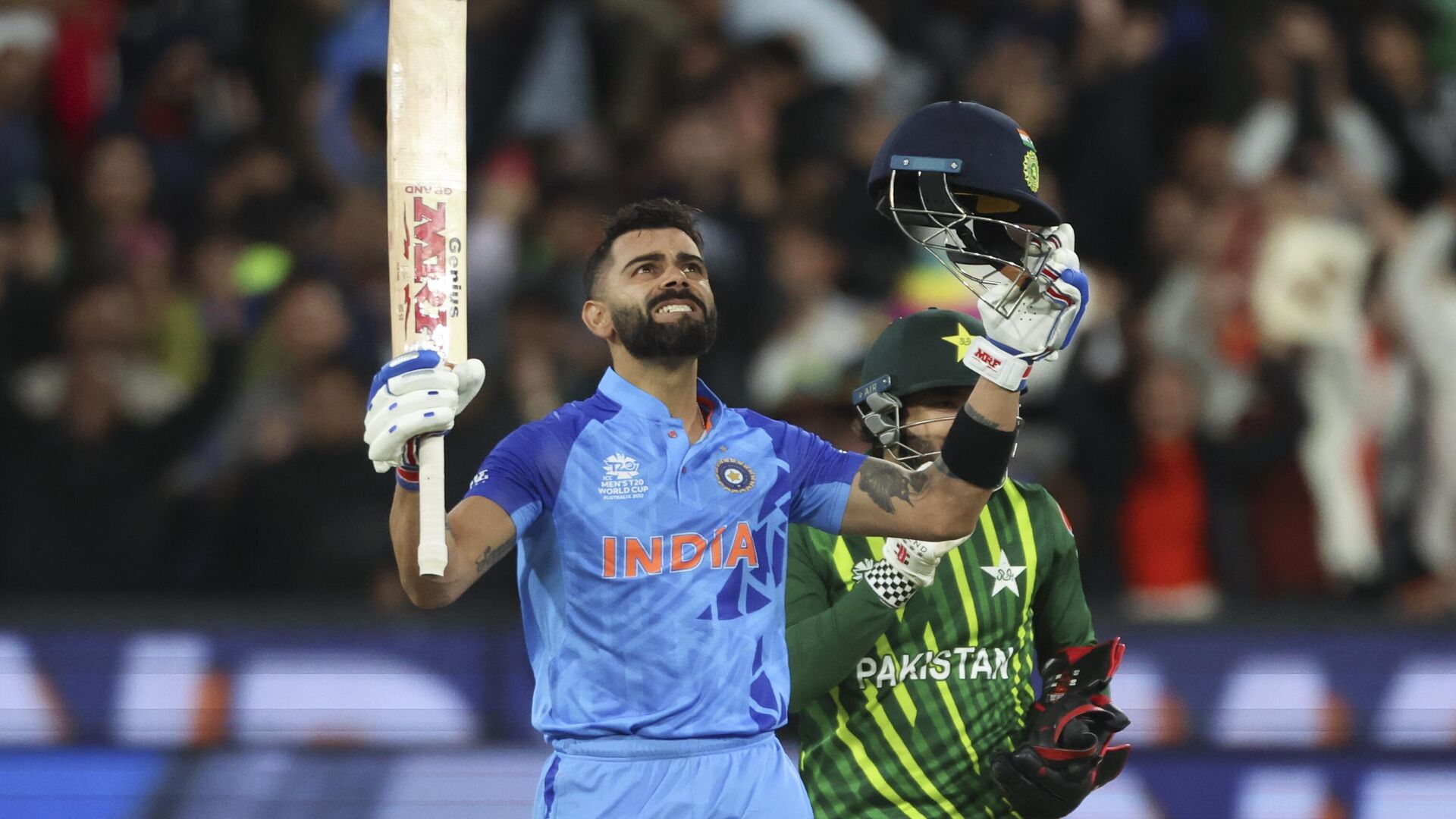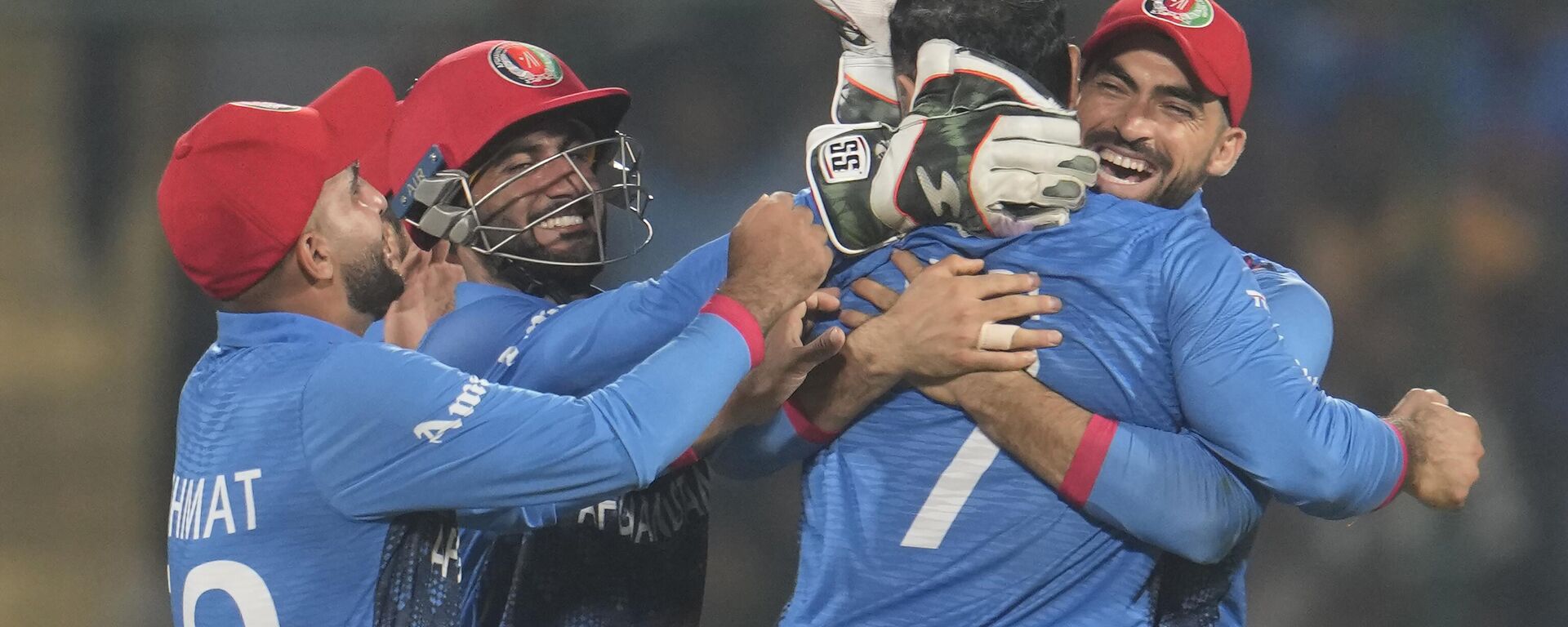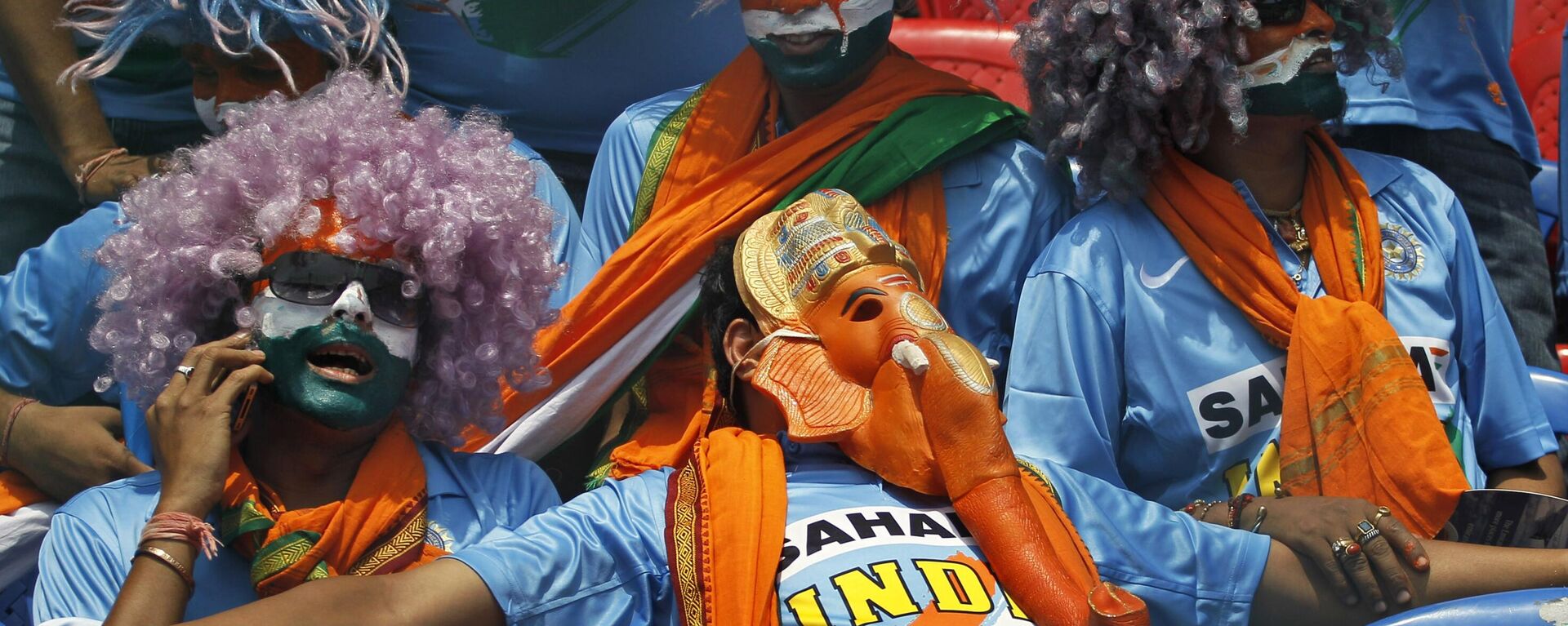https://sputniknews.in/20231221/cricket-diplomacy-bridging-nations--fostering-unity-through-sport-5903436.html
Cricket Diplomacy: Bridging Nations & Fostering Unity Through Sport
Cricket Diplomacy: Bridging Nations & Fostering Unity Through Sport
Sputnik India
Cricket, known for transcending borders, has served as a powerful tool in international diplomacy especially in the context of South Asia.
2023-12-21T13:40+0530
2023-12-21T13:40+0530
2023-12-21T13:40+0530
south asia
imran khan
virat kohli
rajiv gandhi
afghanistan
pakistan
india
international cricket council (icc)
2023 cricket world cup
cricket diplomacy
https://cdn1.img.sputniknews.in/img/07e7/0a/08/4673874_0:160:3043:1872_1920x0_80_0_0_a53f9ea7f53fcfe7a5718c14828233e0.jpg
This ‘Cricket Diplomacy’ unveils compelling narratives that go beyond on-field of competition and rivalry particularly evident in the complex relationship among Afghanistan, India and Pakistan, where cricket has alternately eased and exacerbated historical tensions.In the Cricket World Cup of 2023, when India and Pakistan clashed, it became a monumental event, captivating over a billion viewers. This intense rivalry highlighted that cricket is more than just a game; it evokes deep emotions among fans across the subcontinent.However, one can say that, despite ups and downs among south Asian nations, whether it is Pakistan, Afghanistan, Sri Lanka, or India, when there are good terms, cricket takes precedence, and when tensions flare, cricket once again becomes a significant power tool.Cricket Diplomacy in the Context of Indo-Pak RelationsThe concept of 'cricket diplomacy' gained attention in 1987 when President General Mohammad Zia al-Haq of Pakistan made a surprise visit to India to witness a test match between the two nations. As per media, this visit was part of his "cricket for peace" initiative, aiming to use the sport to improve relations, but it led to a resurgence of border tensions due to alleged disclosures.The India-Pakistan cricket competition is fiercely contested and holds substantial cultural and geopolitical significance, often used as a form of diplomatic sanction. Conversely, cricket also plays a role in high-level bilateral diplomacy.Uniting Nations Through the Soft Power of SportCricket diplomacy goes beyond South Asia's relations. Fidel Castro once challenged the US love for baseball by introducing cricket in Cuba, aiming to undermine American influence through the soft power of sports.In war-torn Afghanistan with socio-political and economic instabilities, cricket has become more than a sport, providing unity, solace, and distraction for a population living amidst enigma. It serves as an escape from harsh realities, uniting people in pursuit of a shared passion and bridging divides.The game's international importance, especially in the context of Afghanistan, has garnered praise from various leaders and analysts, highlighting cricket's potential as a unifying force that transcends cultural and political boundaries.Making note of Afghanistan cricket’s trajectory in the midst of the country’s troubles, Narendra Modi talked to media, “These achievements have come about in challenging and difficult circumstances. This demonstrates the indomitable Afghan spirit to overcome all challenges and realize aspirations for a purposeful, stable, united, and peaceful nation.”The Afghan cricket origin story traces back to the 1980s, where it gained popularity among children in refugee camps around Peshawar, Pakistan, where the sport is as popular as in India. Upon their return to Afghanistan in the early 2000s, enthusiasts worked to establish formal structures for a national team and international competition.In 2015, even, former President Ashraf Ghani requested the Indian government to provide a cricket stadium for the Afghan team in India.Cricket's Role in Shaping Post-Colonial Identity and Fostering Cross-Border UnityPlayers like Sir Garfield Sobers from the West Indies, Sir Don Bradman from Australia, Sachin Tendulkar from India; Imran Khan from Pakistan not only achieved greatness within their own nations but also captured the hearts of cricket lovers and fans worldwide. Their excellence on the cricket field showcased the talent that existed beyond colonial confines, reinforcing the idea that cricket was no longer just the domain of the colonizers.Post-independence, former British colonies such as the India, Pakistan, West Indies, Bangladesh, and Sri Lanka rose to prominence in international cricket. Their successes, often achieved against England, marked a shift in power dynamics, signaling the decline of colonial-era dominance. The West Indies' domination in the 1980s and India's emergence as a cricket superpower serve as prime examples of this shift.India, Afghanistan and Pakistan: The Cricket TriangleThe collaborative efforts of India and Pakistan in training and nurturing Afghan players underscored the spirit of camaraderie and cooperation in the world of cricket. Despite existing uncertainties and ambiguities in their own relationship, both countries provided vital support and guidance to Afghan players, fostering an environment conducive to the development of excellent cricket skills.In 2020, the visit of Imran Khan, the former Prime Minister of Pakistan to Afghanistan further solidified the commitment to supporting Afghan cricket, offering hope, inspiration, and tangible assistance in the form of training and facilities.This gesture symbolized a shared vision for the growth and success of Afghan cricket, transcending political differences and emphasizing the importance of sports as a unifying force.Some of the Glimpses of Cricket World Cup 2023The Cricket World Cup 2023 was full of thrilling moments, including stunning catches with unproductive outcomes, powerful batting performances of players, and intense rivalries between the top teams, like Pakistan and India. The emergence of new talents and the display of sportsmanship also left a lasting impression on fans worldwide.This World Cup brought hope to Afghanistan during instability, as the team's outstanding performance garnered widespread support and admiration, fostering positive relationships among India and Pakistan. Despite challenges, the team's achievements marked significant milestones in the country's cricket history, breaking records and leaving a lasting impact.In this World Cup, the Afghan team defeated not only Pakistan and Sri Lanka but also the previous world cup champion England, earning international acclaim and inspiring hope for the future of cricket in Afghanistan.In a conversation with Sputnik, he praised the exceptional skills of Babar Azam, a Pakistani cricketer, and Virat Kohli, an Indian cricketer, even calling Kohli the "God of Cricket." He stressed the importance of valuing each player without making unnecessary comparisons, promoting a culture of mutual respect and dignity free from political influence.Furthermore, Nadeem highlighted the outstanding performance of Rashid Khan, underscoring his ascent as an excellent cricketer representing Afghanistan. His remarks underscored the spirit of appreciation for individual talents and the celebration of cricket as a unifying force, transcending geopolitical boundaries. Nadeem's sentiments echoed the sentiment that cricket should serve as a platform for fostering camaraderie and admiration for players' skills, independent of political considerations.Moreover he added, “The sport of cricket has played a vital role in the form of confidence building, negotiation, connectivity and vacuum for interaction among nations either India with Pakistan, Australia with England, or Afghanistan to Pakistan.”However, in cricket history one can said and acknowledge the role of cricket can play in high-level bilateral diplomacy. It is the game of cricket, which has connected these South Asian Nations: India, Afghanistan, Srilanka, Bangladesh, and Pakistan.
https://sputniknews.in/20231018/how-india-has-contributed-to-afghanistans-rise-in-cricket-4916274.html
https://sputniknews.in/20231123/pakistan-cricketers--their-love-hate-relationship-with-india-5553085.html
south asia
afghanistan
pakistan
india
Sputnik India
feedback.hindi@sputniknews.com
+74956456601
MIA „Rossiya Segodnya“
2023
Muhammad Sharif
https://cdn1.img.sputniknews.in/img/07e7/0b/05/5257054_0:0:443:444_100x100_80_0_0_b8bd2af32be62a6eecdb4a84c7fd978f.jpg
Muhammad Sharif
https://cdn1.img.sputniknews.in/img/07e7/0b/05/5257054_0:0:443:444_100x100_80_0_0_b8bd2af32be62a6eecdb4a84c7fd978f.jpg
News
en_IN
Sputnik India
feedback.hindi@sputniknews.com
+74956456601
MIA „Rossiya Segodnya“
Sputnik India
feedback.hindi@sputniknews.com
+74956456601
MIA „Rossiya Segodnya“
Muhammad Sharif
https://cdn1.img.sputniknews.in/img/07e7/0b/05/5257054_0:0:443:444_100x100_80_0_0_b8bd2af32be62a6eecdb4a84c7fd978f.jpg
imran khan, virat kohli, rajiv gandhi, ashraf ghani, sachin tendulkar, babar azam, india, pakistan, afghanistan, sri lanka, south asia, australia, bangladesh,us, peshawar, khan, kohli, gandhi, ghani, tendulkar, azam
imran khan, virat kohli, rajiv gandhi, ashraf ghani, sachin tendulkar, babar azam, india, pakistan, afghanistan, sri lanka, south asia, australia, bangladesh,us, peshawar, khan, kohli, gandhi, ghani, tendulkar, azam
This ‘Cricket Diplomacy’ unveils compelling narratives that go beyond on-field of competition and rivalry particularly evident in the complex relationship among Afghanistan, India and Pakistan, where cricket has alternately eased and exacerbated historical tensions.
The sport of cricket, once a legacy of the British Empire, has evolved beyond its colonial origins to symbolize empowerment and resistance for formerly colonized states. It has transformed from a tool of imperial control to a symbol of defiance and equality.
In the
Cricket World Cup of 2023, when India and Pakistan clashed, it became a monumental event, captivating
over a billion viewers. This intense rivalry highlighted that cricket is more than just a game; it evokes deep emotions among fans across the subcontinent.
However, one can say that, despite ups and downs among south Asian nations, whether it is Pakistan, Afghanistan,
Sri Lanka, or India, when there are good terms, cricket takes precedence, and when tensions flare, cricket once again becomes a significant power tool.
Cricket Diplomacy in the Context of Indo-Pak Relations
The concept of 'cricket diplomacy' gained attention in 1987 when President General Mohammad Zia al-Haq of Pakistan made a surprise visit to India to witness a test match between the two nations. As per media, this visit was part of his "cricket for peace" initiative, aiming to use the sport to improve relations, but it led to a resurgence of border tensions due to alleged disclosures.
Cricket diplomacy involves using cricket as a political tactic to influence state level diplomatic ties between cricket-playing nations, given the sport's widespread popularity as per media report.
The India-Pakistan cricket competition is fiercely contested and holds substantial cultural and geopolitical significance, often used as a form of diplomatic sanction. Conversely, cricket also plays a role in high-level bilateral diplomacy.
During a break in the cricket match, it was reported that Zia al Haq Pakistani President allegedly informed Indian Prime Minister Rajiv Gandhi about Pakistan's nuclear bomb, leading to increased tensions at the border in 1987.
Uniting Nations Through the Soft Power of Sport
Cricket diplomacy goes beyond South Asia's relations. Fidel Castro once challenged the
US love for baseball by introducing cricket in Cuba, aiming to undermine American influence through the soft power of
sports.In war-torn Afghanistan with socio-political and economic instabilities, cricket has become more than a sport, providing unity, solace, and distraction for a population living amidst enigma. It serves as an escape from harsh realities, uniting people in pursuit of a shared passion and bridging divides.
The game's international importance, especially in the context of Afghanistan, has garnered praise from various leaders and analysts, highlighting cricket's potential as a unifying force that transcends cultural and political boundaries.
In this regard, the statement of Indian PM Narendra Modi made note of the Afghan cricket team's potential as a nation-building institution and India’s support for this, stating, “Today cricket is a unifying force for the people of Afghanistan. India takes pride in being shoulder-to-shoulder with Afghanistan on this journey.”
Making note of Afghanistan cricket’s trajectory in the midst of the country’s troubles, Narendra Modi talked to
media, “These achievements have come about in challenging and difficult circumstances. This demonstrates the indomitable Afghan spirit to overcome all challenges and realize aspirations for a purposeful, stable, united, and peaceful nation.”
The Afghan cricket origin story
traces back to the 1980s, where it gained popularity among children in refugee camps around
Peshawar, Pakistan, where the sport is as popular as in India. Upon their return to Afghanistan in the early 2000s, enthusiasts worked to establish formal structures for a national team and international competition.
In 2015, even, former President
Ashraf Ghani requested the Indian government to provide a cricket stadium for the Afghan team in India.
Cricket's Role in Shaping Post-Colonial Identity and Fostering Cross-Border Unity
Players like Sir Garfield Sobers from the West Indies, Sir Don Bradman from
Australia,
Sachin Tendulkar from India;
Imran Khan from Pakistan not only achieved greatness within their own nations but also captured the hearts of cricket lovers and fans worldwide. Their excellence on the cricket field showcased the talent that existed beyond colonial confines, reinforcing the idea that cricket was no longer just the domain of the colonizers.
Post-independence, former British colonies such as the India, Pakistan, West Indies,
Bangladesh, and Sri Lanka rose to prominence in international cricket. Their successes, often achieved against England, marked a shift in power dynamics, signaling the decline of colonial-era dominance. The West Indies' domination in the 1980s and
India's emergence as a cricket superpower serve as prime examples of this shift.
India, Afghanistan and Pakistan: The Cricket Triangle
The collaborative efforts of India and Pakistan in training and nurturing Afghan players underscored the spirit of camaraderie and cooperation in the world of cricket. Despite existing uncertainties and ambiguities in their own relationship, both countries provided vital support and guidance to Afghan players, fostering an environment conducive to the development of excellent cricket skills.
In 2020, the visit of
Imran Khan, the former Prime Minister of Pakistan to Afghanistan further solidified the commitment to supporting Afghan cricket, offering hope, inspiration, and tangible assistance in the form of training and facilities.
This gesture symbolized a shared vision for the growth and success of Afghan cricket, transcending political differences and emphasizing the importance of sports as a unifying force.
The collective efforts and support from various stakeholders have not only elevated the Afghan cricket team's performance but also exemplified the transformative impact of sports in fostering goodwill and cooperation among nations.
Some of the Glimpses of Cricket World Cup 2023
The Cricket World Cup 2023 was full of thrilling moments, including stunning catches with unproductive outcomes, powerful batting performances of players, and intense rivalries between the top teams, like Pakistan and India. The emergence of new talents and the display of sportsmanship also left a lasting impression on fans worldwide.
This World Cup brought hope to Afghanistan during instability, as the team's outstanding performance garnered widespread support and admiration, fostering positive relationships among India and Pakistan. Despite challenges, the team's achievements marked significant milestones in the country's cricket history, breaking records and leaving a lasting impact.
In this World Cup, the Afghan team defeated not only Pakistan and Sri Lanka but also the previous world cup champion England, earning international acclaim and inspiring hope for the future of cricket in Afghanistan.
In this context, Nadeem Khan, an Afghan player in under 19th cricket, told Sputnik India, “The need to keep politics separate from the game. Because, cricket as a source of enjoyment and unity, advocating for mutual support and respect among fans, irrespective of nationalities.”
In a conversation with Sputnik, he praised the exceptional skills of
Babar Azam, a Pakistani cricketer, and
Virat Kohli, an Indian cricketer, even calling Kohli the
"God of Cricket." He stressed the importance of valuing each player without making unnecessary comparisons, promoting a culture of mutual respect and dignity free from political influence.
Furthermore, Nadeem highlighted the outstanding performance of Rashid Khan, underscoring his ascent as an excellent cricketer representing Afghanistan. His remarks underscored the spirit of appreciation for individual talents and the celebration of cricket as a unifying force, transcending geopolitical boundaries. Nadeem's sentiments echoed the sentiment that cricket should serve as a platform for fostering camaraderie and admiration for players' skills, independent of political considerations.
Shoaib Ahmed, a former coach of Pakistani Under 19th cricket team, told Sputnik India, “We believe many time it was cricket which helped in making good relation with India, and created soft corridor for talks and negotiation. Even, due to cricket people come closure with one another.”
Moreover he added, “The sport of cricket has played a vital role in the form of confidence building, negotiation, connectivity and vacuum for interaction among nations either India with Pakistan, Australia with England, or Afghanistan to Pakistan.”
However, in cricket history one can said and acknowledge the role of cricket can play in high-level bilateral diplomacy. It is the game of cricket, which has connected these South Asian Nations: India, Afghanistan, Srilanka, Bangladesh, and Pakistan.




